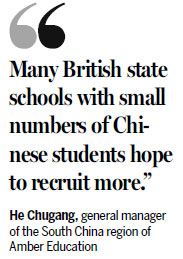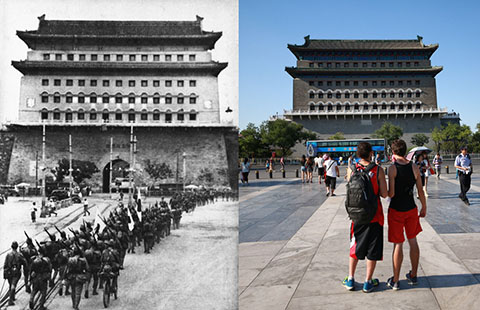Chinese students benefit UK schools, consultant says
Updated: 2015-07-09 07:49
By Cao Yin in London and Zhao Xinying in Beijing(China Daily)
|
||||||||
 |
|
Chinese students who were planning to study at schools in the UK ask about finding places at private schools during an education expo in Beijing in 2013. Wang Zhen / for China Daily |
Chinese students who study at British state schools will bring more benefits than disadvantages to those schools and their students, according to a senior overseas study consultant in China.
"The arrival of Chinese students at British state schools will not reduce the chances of local students being accepted by these schools or universities in the United Kingdom," said He Chugang, general manager of the South China region of Amber Education, an overseas study consulting agency.
He made the remarks after the UK newspaper The Sunday Times reported that the emergence of more Chinese students at British state schools has brought concerns to local parents and education experts.
The newspaper said education experts warned that British children would face being "squeezed out" of the best schools and the top universities such as Oxford and Cambridge if the best state schools kept enrolling more international students, including Chinese ones.
The newspaper also said the entry of British state schools into the Chinese overseas study market would also "deter" British parents, quoting a local agent who helped state schools recruit in China and saying that some British parents removed their children if a class had too many Chinese students.
Exaggerations seen
In the view of He, whose company has cooperated with more than 300 state and private schools in the UK, these worries and concerns are exaggerated.
"In fact, an overwhelming majority of Chinese families who decided to send their children to study at middle schools of the UK have good financial capabilities and prefer expensive private schools over state schools," He said.
He added that students of British private schools, also known as independent schools - where fees range between 30,000 pounds ($46,100) and 40,000 pounds a year, and educational resources are better - have greater chances of being accepted by top universities.
Lu Hong, a Chinese mother living in Brighton, a city on the south coast of England, said she understood the worries of British parents. However, she said that Chinese parents like her had no choice but to send their children to state schools.
The 48-year-old, who obtained a master's degree and doctorate in the UK and has lived in the country for 20 years, told China Daily that she had considered sending her daughter to a British independent school "but lacked the financial means".
"Chinese parents who work in Britain would like to give their children a better education, but without enough money, the state schools that also have enrollment quality control are a good choice," said Lu.
Many Chinese parents with higher incomes, such as those running their own businesses, tend to send their children to independent schools, she added.
She said that her daughter's school started taking Chinese students in 1997 and that the percentage has been rising during the past few years.
Minimal percentage
According to He, Chinese students now make up a minimal percentage at many state schools of the UK, a sharp contrast with the situation in private schools.

The Sunday Times report said a survey last year found that among 24,391 overseas students who registered in 1,257 independent schools in the UK, 18 percent came from the Chinese mainland.
He calculated that the proportion of Chinese students at British state schools is around 3 percent or lower.
"The situation is far from severe enough to annoy British parents," He said. "In fact, many British state schools with small numbers of Chinese students hope to recruit more, through agencies like us, to increase cultural diversity."
John Abbott, principal of Richard Huish College in Taunton, Somerset, where many of the students are from the Chinese mainland, was quoted by The Sunday Times as saying there were cultural benefits, and the British benefit from the work ethic of their Chinese peers.
The additional income derived from overseas students has also helped some state schools overcome financial difficulties, which encourages such schools to recruit Chinese students.
Abbott told The Sunday Times that his school received 4,560 pounds a year for each British student from state funding and charged overseas students a fee of 12,000 pounds, a sum that will rise to 15,000 pounds next year.
The extra income has enabled him to maintain classes such as music, art, drama and sports, which he would otherwise have had to cut.
Contact the writer at zhaoxinying@chinadaily.com.cn

 Plane makes emergency landing after fire
Plane makes emergency landing after fire
 Ten photos you don' wanna miss - July 8
Ten photos you don' wanna miss - July 8
 Female robot sings in Shanghai
Female robot sings in Shanghai
 Stunning images of Tibetan Buddhist pilgrims
Stunning images of Tibetan Buddhist pilgrims
 Then and Now: Beijing’s historic sites as witnesses of war
Then and Now: Beijing’s historic sites as witnesses of war
 In photos: China from above
In photos: China from above
 Serena Williams beats sister Venus to reach last eight
Serena Williams beats sister Venus to reach last eight
 Culture insider: Six things you may not know about Minor Heat
Culture insider: Six things you may not know about Minor Heat
Most Viewed
Editor's Picks

|

|

|

|

|

|
Today's Top News
SCO summit to take up India's membership
Xi, Putin agree to actions on connectivity proposals
China shares listed in US see selling
US orchestra to play China
China answers Clinton charges
President Obama addresses IS threat
China has ability to deal with risks to economy: premier
Govt prefers peaceful means in resolving maritime row: Envoy
US Weekly

|

|







